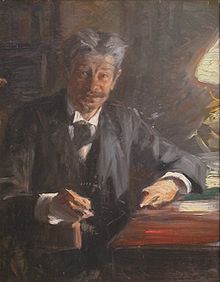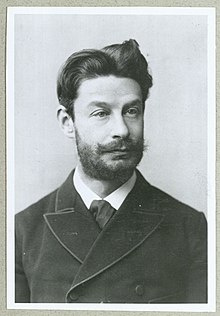Georg Brandes

Georg Morris Cohen Brandes (born February 4, 1842 in Copenhagen , † February 19, 1927 there ) was a Danish literary critic , philosopher and writer . He gained great importance as a mediator of Scandinavian literature abroad and of European tendencies in Scandinavia. Brandes made a significant contribution to moving Scandinavian literature to the "departure into modernity" (Danish Det modern Gennembrud ) by promoting authors of realism and naturalism . With his brother, the politician and writer Edvard Brandes , who supported him all his life, he founded the newspaper Politiken .
Life
Georg Brandes was born in Copenhagen into a bourgeois assimilated Jewish family, the older brother of Ernst Brandes (1844-1892), a writer and journalist, and Edvard Brandes. He studied law and philosophy at the University of Copenhagen and graduated with a dissertation on French philosophers. Brandes traveled half of Europe, lived in Berlin between 1877 and 1882 and was appointed professor of philosophy at the University of Copenhagen in 1902.
The awakening interest in Nordic literature was thanks to his speeches and publications in German-speaking countries. In Denmark, among other things, he made Polish and Russian literature known.
He wrote witty essays and biographies e.g. B. About Johann Wolfgang von Goethe , Michelangelo , William Shakespeare or Voltaire . Citing William Shakespeare, Brandes called for a realistic representation of characters in literature. His work also shows influences from Hippolyte Taine , Charles-Augustin Sainte-Beuve , Auguste Comte and John Stuart Mill .
Early on he singled out Søren Kierkegaard as a committed champion of emancipatory ideas ; his Kierkegaard biography from 1877 was also published in German in 1879. As early as 1888 Brandes gave lectures on Friedrich Nietzsche , with whom he was in correspondence, and made his philosophy known in Denmark. Nietzsche, whose works would subsequently become an incomparable triumph, responded enthusiastically to the long-awaited response - and also to Brandes' description of his thinking as aristocratic radicalism . Brandes developed under Nietzsche's influence from a people's democrat to an elite thinker. In 1897 Brandes was elected to the American Academy of Arts and Sciences .
Brandes is still considered the originator of an anti-clerical mindset in Scandinavia today .
The young Thomas Mann mentioned Brandes in the essay "From the intellectual and cultural life of our time", which was published in the newspaper of his brother Heinrich Mann, The Twentieth Century , 1895/96. In it he called Brandes a "privately quite uninteresting free-thinking Jew" ; this formulation served the clichéd idea of an alliance between Judaism and liberalism . At the same time, Thomas Mann attested to his real artistry in his work as a critic.
Georg Brandes Prize
Since 1969, the Danish Association of Literature Critics Lav has awarded the Georg Brandes Prize annually for a work in the field of literary criticism or literary research.
Works
Single issues
- From the realm of absolutism . Leipzig 1896 ( digitized from the holdings of the Leibniz Institute for East and Southeast European Research ).
- Main Streams of Nineteenth Century Literature. Six parts in three volumes, Franz Duncker Berlin 1872. Further editions a. a. third edition Erich Reiss, Berlin 1924.
- The Jesus saga . Berlin, Erich Reiss-Verlag (1925).
- Nietzsche . A Treatise on Aristocratic Radicalism . Berenberg Verlag, Berlin 2004, ISBN 3-937834-03-6 .
- The hatred of truth. About Germany and Europe 1880-1925 . Berenberg Verlag, Berlin 2007, ISBN 978-3-937834-19-1 .
- Henrik Ibsen , The Literature. Collection of illustrated individual representations. Volume 32. Marquardt (ca.1900).
- Anatole France , The literature. Collection of illustrated individual representations. Volume 20. Marquardt (ca.1900).
- Voltaire . 6th edition. Erich Reiss Verlag, Berlin 1922 (2 vols. In 1 vol .; translated by Emilie Stein and Ernst R. Eckkert).
- Cajus Julius Caesar . Berlin: Erich Reiss 1925. (2 volumes)
Work edition
- Pick up scripters . Gyldendal Verlag, Copenhagen 1899/1910 (18 vol.).
literature
- The World at War - Internet Archive , essays by Georg Brandes on World War I translated into American, Macmillan, New York 1917.
- Henning Fenger : The unge Brandes. Gyldendal, Copenhagen 1957.
- Peter Goßens: Modern minds. Literary canon and Jewish identity in Georg Brandes. In: Wilfried Barner , Christoph König (ed.): Jewish intellectuals and the philologies in Germany 1871–1933. Wallstein, Göttingen 2001, pp. 299-307
- Heinrich Eduard Jacob : That was Georg Brandes. In: Benno Reifenberg , Wolfgang Weyrauch (Ed.): Federlese. An almanac from the German PEN Center of the Federal Republic of Germany. Desch, Munich 1967, pp. 108-114.
- Werner Thierry : Georg Brandes. Værk and skræbne. Spectrum, Copenhagen 1999, ISBN 87-7763-186-2 .
- Günter Helmes : Georg Brandes and French Naturalism. With particular reference to Émile Zola . In: Matthias Bauer , Ivy York Möller-Christensen (ed.): Georg Brandes and the modernity discourse . Igel-Verlag, Literature & Science, Hamburg 2013, ISBN 978-3-86815-571-6 , pp. 42–74.
- Brandes, Georg. In: Lexicon of German-Jewish Authors . Volume 3: Birk – Braun. Edited by the Bibliographia Judaica archive. Saur, Munich 1995, ISBN 3-598-22683-7 , pp. 385-398.
- Birgitt Müller: Brandes, Georg. In: Handbuch des Antisemitismus , Volume 2/1, 2009, p. 99 ff.
- Gerd-Hermann Susen (Ed.): Wilhelm Bölsche . Correspondence with authors of the Freie Bühne. Weidler Buchverlag, Berlin 2010 (letters and comments), pp. 555–563.
Web links
- Georg Brandes and Arthur Schnitzler. An exchange of letters. Edited by Kurt Bergel. Bern: Francke 1956. Online as PDF at Edition Arthur Schnitzler: Correspondence with authors
- Literature by and about Georg Brandes in the catalog of the German National Library
- Works by and about Georg Brandes in the German Digital Library
- Newspaper article about Georg Brandes in the press kit of the 20th century of the ZBW - Leibniz Information Center for Economics .
- Entry about Georg Brandes ( memento from June 26, 2013 in the web archive archive.today ) on Literature in Context , a multilingual project of the University of Vienna (in German , archived from the original ).
- Works by Georg Brandes in the Gutenberg-DE project
Individual evidence
- ↑ Peter Sprengel : History of German-Language Literature 1870-1900. From the founding of the empire to the turn of the century. Munich 1998, ISBN 3-406-44104-1 , p. 71, 8. Zvo
- ↑ See Kurt Löwenstein : Thomas Mann on the Jewish question , Bitaon Limited, Tel Aviv 1967, chapter “Beginnings” (PDF online) on kurt-loewenstein.info p. 13.
- ^ Peter Sprengel: History of German-Language Literature 1900–1918. From the turn of the century to the end of the First World War. Munich 2004, ISBN 3-406-52178-9 , p. 101, 13. Zvu
| personal data | |
|---|---|
| SURNAME | Brandes, Georg |
| ALTERNATIVE NAMES | Brandes, Georg Morris Cohen (full name) |
| BRIEF DESCRIPTION | Danish writer |
| DATE OF BIRTH | February 4, 1842 |
| PLACE OF BIRTH | Copenhagen |
| DATE OF DEATH | February 19, 1927 |
| Place of death | Copenhagen |

